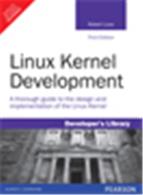Linux Kernel Development

|
Author(s):
Author:
Robert Love
- ISBN:9788131758182
- 10 Digit ISBN:8131758184
-
Price:Rs. 1000.00
- Pages:440
- Imprint:Pearson Education
- Binding:Paperback
- Status:Available
-
|
Linux Kernel Development details the design and implementation of the Linux kernel, presenting the content in a manner that is beneficial to those writing and developing kernel code, as well as to programmers seeking to better understand the operating system and become more efficient and productive in their coding.
The book details the major subsystems and features of the Linux kernel, including its design, implementation, and interfaces. It covers the Linux kernel with both a practical and theoretical eye, which should appeal to readers with a variety of interests and needs.
The author, a core kernel developer, shares valuable knowledge and experience on the 2.6 Linux kernel. Specific topics covered include process management, scheduling, time management and timers, the system call interface, memory addressing, memory management, the page cache, the VFS, kernel synchronization, portability concerns, and debugging techniques. This book covers the most interesting features of the Linux 2.6 kernel, including the CFS scheduler, preemptive kernel, block I/O layer, and I/O schedulers.
Table of Content
- Introduction to the Linux Kernel
- Getting Started with the Kernel
- Process Management
- Process Scheduling
- System Calls
- Kernel Data Structures
- Interrupts and Interrupt Handlers
- Bottom Halves and Deferring Work
- An Introduction to Kernel Synchronization
- Kernel Synchronization Methods
- Timers and Time Management
- Memory Management
- The Virtual Filesystem
- The Block I/O Layer
- The Process Address Space
- The Page Cache and Page Writeback
- Devices and Modules
- Debugging
- Portability
- Patches, Hacking, and the Community
|
Salient Features
Authored by a well-known member of the Linux kernel development team with a reputation for a highly readable and focused writing style
Updated and improved coverage of all the major subsystems and features of the latest version of the Linux 2.6.xx kernel, with new coverage of kernel data structures
Allows developers to learn how to modify and enhance kernel code by providing examples based on real kernel code
Details on interrupt handlers and bottom halves
Extended coverage of virtual memory and memory allocation
Information on debugging kernel code
Examples of kernel synchronization and timers
Useful insight into submitting kernel patches and working with the Linux kernel community
|
|
|
|
|